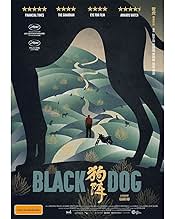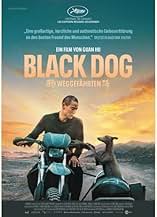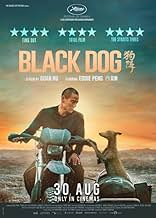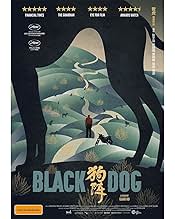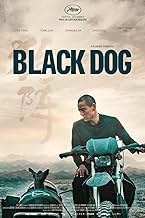Released from jail, Lang returns to his hometown in Northwest China. As part of a dog patrol tasked with clearing stray dogs before the 2008 Olympics, he bonds with a black stray. The two lo... Read allReleased from jail, Lang returns to his hometown in Northwest China. As part of a dog patrol tasked with clearing stray dogs before the 2008 Olympics, he bonds with a black stray. The two lonely souls embark on a new journey together.Released from jail, Lang returns to his hometown in Northwest China. As part of a dog patrol tasked with clearing stray dogs before the 2008 Olympics, he bonds with a black stray. The two lonely souls embark on a new journey together.
- Awards
- 17 wins & 22 nominations total
Featured reviews
"Lang" (Eddie Peng) has returned to his hometown after a term in prison. We learn a little more about the causes of that and of his distant relationship with his zoo-keeping father as the story develops, as well as discovering that he once was one of the place's more famous citizens being in a popular local band. With the Beijing Olympiad (2008) looming large, there is quite an emphasis for the government on tarting the place up - and that signals quite significant "improvements" for their home on the edge of the Gobi desert. Much of it has already been earmarked for demolition, and with most of the heart (and soul) of the place already removed, the authorities turn their attention to the serious problem of hundreds of feral dogs marauding around potentially spreading rabies. There is one particularly skinny black one that is worth 1000 Yuan if it can be caught, and that's the target for the motor-cycling "Lang". Thing is, this mutt is no mug, and is soon doing more of the chasing (and biting). One particularly embarrassing nibble sees both confined to his home in quarantine and that's when the bonds begin to become established and we also realise the extent of hostility felt by some to this man. With the bulldozers never far away, his ailing dad's zoo no longer able to care for it's tenants and the vengeful butcher "Hu" (Hu Xiaoguang) and his thugs out for revenge, we settle into a tale of this newfound friendship that's quite engaging. It's predictable in stages, but it's really the largely dialogue-free effort from Peng set against a backdrop of relentless winds, dust and trains rolling through the increasingly lifeless town that gives this a bit of potency. It's not so much that the town is being cleared because of the Olympics, though that's clearly on director Hu Guan's mind, it's that why was a town ever here in this inhospitable place in the place? It's bleak and forlorn, a concrete oasis in the middle of nowhere and that setting works well as the man himself comes across as lonely, detached as well as emotionally and physically rootless. It's a slow watch, but not one that drags, for two hours and it rather effectively sums up an existence of mundanity, lack of opportunity and a desire for a true sense of freedom quite well. Be warned, not a great deal happens - but I did enjoy it.
It's a good movie and i wish i would have liked it more and rated it higher. It's so well directed that made me somewhat enjoy it even though nothing significant was happening, specifically during the first 50 minutes. The parallelism between the leading character and this dog was spot-on, the development of their "relationship" as well.
But still, there are some big flaws. First of all, its running time. It should have been at least 15 minutes shorter. I said i enjoyed it but it was too uneventful at some point. I love poetic and minimalist movies but not like this. Story is almost beautiful but simple, there was no reason to stretch it out so much. Ok, it was beautifully shot but after all, it was mostly an urban landscape.
And as another reviewer already mentioned, at times "The plot felt aimless". I didn't understand the entirety of what happened in this movie. Random things kept happening without promoting the story.
However, despite its flaws, this is a good and ambitious movie, well directed as i said but well acted too. The leading character was silent but as a viewer, i understood him, i felt his alienation, his quite desperation and his bond with this dog, the whole thing was touching and natural, not for a moment it felt fake. There were some gorgeous scenes, a great soundtrack with Pink Floyd's songs which were used so effective. And the ending was powerful.
A meditative movie which could have been so much better.
But still, there are some big flaws. First of all, its running time. It should have been at least 15 minutes shorter. I said i enjoyed it but it was too uneventful at some point. I love poetic and minimalist movies but not like this. Story is almost beautiful but simple, there was no reason to stretch it out so much. Ok, it was beautifully shot but after all, it was mostly an urban landscape.
And as another reviewer already mentioned, at times "The plot felt aimless". I didn't understand the entirety of what happened in this movie. Random things kept happening without promoting the story.
However, despite its flaws, this is a good and ambitious movie, well directed as i said but well acted too. The leading character was silent but as a viewer, i understood him, i felt his alienation, his quite desperation and his bond with this dog, the whole thing was touching and natural, not for a moment it felt fake. There were some gorgeous scenes, a great soundtrack with Pink Floyd's songs which were used so effective. And the ending was powerful.
A meditative movie which could have been so much better.
Outstanding drama directed by Hu Guan from China, so, no wonder it won the top honour in the Un Certain Regard sidebar at Cannes for this year.
The story revolves around a guy who, following a period of incarceration, comes home and takes a job ridding a town of stray dogs in time for the Olympic Games. The drama is set on the edge of the Gobi desert in Northwest China. However, he unexpectedly bonds with a black dog, and the two of them set out on a new adventure.
The dog star of the movie took home a dog award earlier in the day when he received the Palm Dog Grand Jury prize! If you love dogs, amazing cinematography, exceptional acting and directing - do not miss this one... impossible not to enjoy it!
The story revolves around a guy who, following a period of incarceration, comes home and takes a job ridding a town of stray dogs in time for the Olympic Games. The drama is set on the edge of the Gobi desert in Northwest China. However, he unexpectedly bonds with a black dog, and the two of them set out on a new adventure.
The dog star of the movie took home a dog award earlier in the day when he received the Palm Dog Grand Jury prize! If you love dogs, amazing cinematography, exceptional acting and directing - do not miss this one... impossible not to enjoy it!
I had no idea idea what to expect when I saw this movie. It was slow moving but fully engrossing. It is set amongst a somewhat grim environment but really opened my eyes to how people exist in some parts of China. It is an austere existence, barren and treeless yet the town is gearing up for the 2008 Beijing Olympics with propaganda blasted over the loudspeakers in true communist China fashion.
Although it is a sobering film, there are several parts that are quite humorous and while it isn't heavy on dialogue, it is what NOT is said that makes you think.
I can see what this was a winner at CANNES.
Although it is a sobering film, there are several parts that are quite humorous and while it isn't heavy on dialogue, it is what NOT is said that makes you think.
I can see what this was a winner at CANNES.
A minibus is heading for a small, desolate town on the edge of the Gobi desert. A pack of stray dogs charges towards it, scaring the driver and tipping over the bus. Out of it comes Lang, an ex-convict who used to be a popular stunt motorcyclist, now returning to his hometown after 10 years in prison for the murder of a local gangster's nephew. A few conversations with the police later, the title card appears, and the magic of Black Dog begins. A poetic and minimalist film of healing and moving on, portrayed through a friendship, a bond, a spiritual connection between man and dog. The man is Lang, and the dog is the infamous thin black dog that has been terrorizing the town. Rumored of carrying rabies, the black dog goes around defending his territory by pissing on walls and biting people, so everyone is out to catch him.
Black Dog is a story of two lonely strays caged by a world that does not understand them. Two lost souls alienated by the society around them. Two black sheep who do not fit in. Lang is marginalized because of his past as a "murderer", and the black dog is also alienated amongst the other strays for being the biggest, strongest, fastest and most aggressive of all the dogs. One of Guan Hu's main messages in Black Dog is that no animal is evil. Humans can be, but dogs cannot. Stray dogs are violent because they're in constant fear, trying to survive in an evolving environment where they do not belong. Lang is similar to a stray dog. He's not like the others. He only says a few words in the whole film as he's very quiet and introverted. Like the black dog, he's trying to make a life for himself in a town that's in the process of modernization. After his time in prison, Lang has changed, and so did the town and the people he once knew. So now, he doesn't speak, he only exists and goes with the flow. That's why Lang and the black dog are so perfect for each other and why they instantly connected-they're both just trying to survive in a world they no longer know, a world that no longer wants them.
Black Dog is set during an important time for China, a time of urbanization and change. And this little town is impacted deeply. Most of its residents have fled, leaving their dogs behind, who now roam free in the streets and in the desert hills. The zoo is running out of money to sustain the animals, so they too are freed in the desert. The circus is trying to survive, but business hasn't been good. The old is being demolished to make way for the new, which is a clever pararell with the ending of the film, where the black dog dies but leaves behind a new generation of black puppies. The cinematography of Black Dog is gorgeous, with Guan Hu adopting the new "slow-cinema" Chinese style of Bi Gan, which made me fall in love with the film almost instantly. Long, panoramic shots of beautiful landscapes, quiet scenes of motorcycle rides and slow walks through dusty roads and desolate rural villages, are all complemented with a lonesome atmosphere.
Scenes like Lang and the black dog calmly passing through the desert's stray dogs, and the solar eclipse sequence with the zoo's tiger wandering the town's streets freely, are two of my favorite of the entire year so far. And the final shot of Black Dog is so beautiful and meaningful. Through his canine companion, Lang finally learns how to keep on living despite his dark past, and how to find happiness within life's miseries. The Pink Floyd soundtrack gives a certain nostalgia to Guan Hu's relaxing images, and the acting performances are absolutely stellar, human and animal alike, from Eddie Peng to the black dog named Xiao Xin, and the majestic tiger. Just the fact that Eddie Peng developed such a strong bond with Xiao Xin while filming that he felt he had to adopt him afterwards, is a beautiful real-life illustration of the message of this wonderful film. A melancholic and meditative journey of finding your place in the world through friendship, and a genuine tribute to man's best friend, Black Dog is simply one of the best films of the year, and proof that Chinese arthouse cinema is still very much alive.
Black Dog is a story of two lonely strays caged by a world that does not understand them. Two lost souls alienated by the society around them. Two black sheep who do not fit in. Lang is marginalized because of his past as a "murderer", and the black dog is also alienated amongst the other strays for being the biggest, strongest, fastest and most aggressive of all the dogs. One of Guan Hu's main messages in Black Dog is that no animal is evil. Humans can be, but dogs cannot. Stray dogs are violent because they're in constant fear, trying to survive in an evolving environment where they do not belong. Lang is similar to a stray dog. He's not like the others. He only says a few words in the whole film as he's very quiet and introverted. Like the black dog, he's trying to make a life for himself in a town that's in the process of modernization. After his time in prison, Lang has changed, and so did the town and the people he once knew. So now, he doesn't speak, he only exists and goes with the flow. That's why Lang and the black dog are so perfect for each other and why they instantly connected-they're both just trying to survive in a world they no longer know, a world that no longer wants them.
Black Dog is set during an important time for China, a time of urbanization and change. And this little town is impacted deeply. Most of its residents have fled, leaving their dogs behind, who now roam free in the streets and in the desert hills. The zoo is running out of money to sustain the animals, so they too are freed in the desert. The circus is trying to survive, but business hasn't been good. The old is being demolished to make way for the new, which is a clever pararell with the ending of the film, where the black dog dies but leaves behind a new generation of black puppies. The cinematography of Black Dog is gorgeous, with Guan Hu adopting the new "slow-cinema" Chinese style of Bi Gan, which made me fall in love with the film almost instantly. Long, panoramic shots of beautiful landscapes, quiet scenes of motorcycle rides and slow walks through dusty roads and desolate rural villages, are all complemented with a lonesome atmosphere.
Scenes like Lang and the black dog calmly passing through the desert's stray dogs, and the solar eclipse sequence with the zoo's tiger wandering the town's streets freely, are two of my favorite of the entire year so far. And the final shot of Black Dog is so beautiful and meaningful. Through his canine companion, Lang finally learns how to keep on living despite his dark past, and how to find happiness within life's miseries. The Pink Floyd soundtrack gives a certain nostalgia to Guan Hu's relaxing images, and the acting performances are absolutely stellar, human and animal alike, from Eddie Peng to the black dog named Xiao Xin, and the majestic tiger. Just the fact that Eddie Peng developed such a strong bond with Xiao Xin while filming that he felt he had to adopt him afterwards, is a beautiful real-life illustration of the message of this wonderful film. A melancholic and meditative journey of finding your place in the world through friendship, and a genuine tribute to man's best friend, Black Dog is simply one of the best films of the year, and proof that Chinese arthouse cinema is still very much alive.
Did you know
- TriviaEddie Peng [the lead] established such a strong bond with Xin, the dog featured in the film, that he adopted him after filming had wrapped.
- ConnectionsReferenced in Close-Up: The Best Films and Other Results of 2024 (2024)
- SoundtracksMother
Written by Roger Waters
Performed by Pink Floyd
Details
Box office
- Gross worldwide
- $2,336,260
- Runtime1 hour 56 minutes
- Color
- Sound mix
- Aspect ratio
- 2.47 :1
Contribute to this page
Suggest an edit or add missing content


